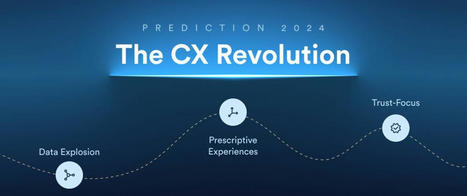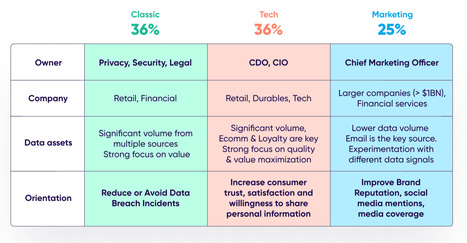 Your new post is loading...

|
Scooped by
Marteq
|
The article highlights concerns among Americans about online data privacy, with 84% worried about their data when interacting with brands online. It shows a trend of consumers pulling back from sharing data, with 85% sometimes opting out of company mailing lists and 58% doing so habitually. Additionally, 48% of consumers are more likely to trust brands that collect zero-party data, which is shared willingly to help shape products and services.

|
Scooped by
Marteq
|
The transition to first-party data is reshaping online retail, offering opportunities for enhanced personalization and trust. Retailers must navigate new data privacy laws, shifting from third-party data to a more direct relationship with customers. This change, while challenging, enables a deeper understanding of consumer preferences and fosters trust, leading to more personalized shopping experiences.

|
Scooped by
Marteq
|
Organisations are facing rising privacy concerns and trust challenges over their use of generative artificial intelligence, even as they are getting attractive returns from privacy investments, the 2024 Data Privacy Benchmark Study by Cisco shows. Around 63% have established limitations on what data can be entered, and 61% have limits on which Gen AI tools can be used by employees. More than one-fourth (27%) said their organisation had banned Gen AI applications altogether for the time being.

|
Scooped by
Marteq
|
AI-driven personalization in various industries raises concerns about privacy and free will, as it often relies on personal and identifiable data from mobile phone usage. There's a growing need for Privacy by Design to ensure GDPR compliance. The potential misuse of AI, such as in the medical field or in predicting criminal behavior, highlights the importance of data integrity and the right to be forgotten. AI's role in recruitment and performance analysis further underscores the need for ethical data handling. The article concludes with a caution about the power of AI and data processing, referencing Lord Acton's quote about the corrupting nature of absolute power.

|
Scooped by
Marteq
|
CleverTap identifies key MarTech trends for 2024 focusing on data privacy regulations, AI advancements, and personalized content. Generative AI will evolve to provide strategic content and customer engagement advice. Brands will shift from ROI to ROX, emphasizing long-term customer experiences. The integration of AI assistants into omnichannel strategies will expand. Finally, zero-party data will gain importance with the end of third-party cookies, focusing on ethical data practices and trust-building.

|
Scooped by
Marteq
|
The podcast episode "How to Make Every Guest Touchpoint Count and Lead Guest Experiences with Trust" from Hospitality Net features Karen Stephens, CRO of Revinate, and Andrew Ladd, VP of Marketing at Noble Hotels & Resorts. They discuss the importance of gaining guests' trust in the hospitality industry and leveraging technology for data collection while ensuring data privacy and security. They emphasize personalization in creating guest experiences, highlighting the challenges in balancing digital engagement with maintaining consumer data privacy. Ladd shares insights on hospitality marketing trends, including adapting strategies post-COVID and focusing on customer experience beyond just selling rooms.

|
Scooped by
Marteq
|
In the section "With Great Data Comes Great Responsibility," the focus is on the ethical handling of the vast amounts of customer data available to brands. It emphasizes the need for transparency and security in data management, addressing consumer concerns about data privacy. The shift towards privacy-first initiatives like Google phasing out third-party cookies and the rise of zero-party data, which is information shared willingly by consumers, are highlighted. The article also discusses the role of AI in amplifying the significance of smaller, willingly shared datasets, thereby enhancing customer engagement through more personalized experiences.

|
Scooped by
Marteq
|
The article discusses the influence of Data Protection Impact Assessments (DPIAs) on data privacy laws. DPIAs are increasingly significant in shaping privacy legislation, offering a proactive approach to data privacy concerns. They play a key role in identifying risks, ensuring compliance, and enhancing consumer trust. DPIAs are now integral to data processing strategies, promoting accountability and transparency in handling personal data. Their adoption influences policy frameworks, ensuring that data privacy rules remain relevant and efficient.

|
Scooped by
Marteq
|
Cybersecurity and data privacy were major issues in 2023, especially with the rise of generative AI. Law firms and legal tech companies faced increased cyber attacks from groups like LockBit, CLOP, and BlackCat/ALPHV. The EU-U.S. Data Privacy Framework was adopted, addressing transatlantic data flows. Experts discussed the importance of robust data governance, changes in legal regulation, and the concept of ethical web scraping. There was also a focus on the challenges of managing privacy and ownership in the context of AI development.

|
Scooped by
Marteq
|
Meta is launching an ad-free tier for Instagram and Facebook in Europe, costing up to 12.99 euros a month. This move is seen as a response to regulations and a potential revenue opportunity. Ad-free models are increasingly popular, with Netflix and other streaming services adopting similar models. Meta's decision raises questions for advertisers on the platforms, as it could lead to a decrease in ad inventory and higher ad prices. The new model tests users' willingness to pay for privacy and a premium experience, and its success could influence similar initiatives in the U.S.

|
Scooped by
Marteq
|
Last year's generative AI surge led to increased scrutiny over data privacy and ownership. Denas Grybauskas from Oxylabs discusses legal concerns around web scraping, particularly for AI needs. Key issues include intellectual property rights, fair use of public data, and privacy concerns over personal data collection. Ethical web scraping principles are emerging, focusing on privacy, website functionality, and legitimate business use. Legal challenges might affect AI innovation, but are unlikely to halt it, as data is crucial for AI development.

|
Scooped by
Marteq
|
The decline of third-party cookies and the rise of AI-driven technologies have pushed marketers to focus on first-party data for privacy-sensitive personalization. The article emphasizes the need for creative and innovative techniques that respect user privacy while still providing valuable insights. Marketers are encouraged to leverage advanced analytics, collaborate across departments, and continuously analyze data for effective personalization. The importance of interoperability in managing digital identities and the need for a comprehensive approach to audience engagement are highlighted. Flexibility and adaptation are key for marketers to harness the potential of first-party data while maintaining privacy-centric personalized experiences.

|
Scooped by
Marteq
|
In a rapidly evolving digital landscape, Chief Marketing Officers (CMOs) are facing new challenges in data privacy and quality. The article from The Drum provides a comprehensive checklist for CMOs to navigate these challenges in 2024, emphasizing the need for proactive privacy strategies, collaboration with legal teams, and C-suite sponsorship for a privacy-first culture. It also highlights the importance of enhancing learning to make privacy a core skill, upgrading technology suites for privacy protections, and becoming comfortable with machine learning and automation. The checklist aims to help CMOs adapt to a privacy-centric marketing environment, ensuring that their strategies align with evolving consumer expectations and regulatory requirements.
|

|
Scooped by
Marteq
|
With growing data privacy concerns and changes in data protection regulations, marketing specialists have started to prioritize customer privacy in their campaigns and martech platforms. This approach involves transparent data practices, reliance on first-party and zero-party data, and building trust with users.
Today, organizations are way more transparent about how they collect, use, and store customer data. Clear communication and enhanced security measures are essential to build trust with consumers. Also, companies are shifting away from third-party cookies towards first-party data gathered directly from users based on their interactions and preferences. Zero-party data refers to information that customers provide willingly, making marketing more transparent and consent-driven.
In the next few years, finding the perfect balance between a high level of personalization and respect for user privacy will become the main challenge for marketing professionals worldwide. Privacy-enhancing technologies, such as secure multi-party computation and differential privacy, will allow organizations to analyze customer data without compromising privacy. With consumers becoming more concerned with their rights, privacy-focused marketing will be even more critical for building trust with users and increasing customer loyalty in the near future. We can expect that in the era of strict privacy regulations, the importance of zero-party data gathering will continue to grow and in 2024 it will become more widely known and used by companies from all around the world in their marketing technology strategies.

|
Scooped by
Marteq
|
Below are five issues in the data privacy and cybersecurity space that businesses may see trending in 2024.
1. Cybersecurity Rules by the SEC and the EU
2. Server-Side Tracking Replaces Browser-Side Tracking
3. Training AI Models
4. Washington State’s New Health Privacy Law
5. Legislation Loves Company

|
Scooped by
Marteq
|
1. Be proactive with your strategy to build trust
2. Work hand-in-hand with legal for competitive differentiation
3. Get sponsorship from the C-suite to create the right culture
4. Enhance your learning to make privacy a core skill
5. Upgrade your technology suite for privacy protections
6. Get comfortable with machine learning & automation
7. Make privacy your creative differentiator
8. Get the right data practices in place
9. Be agile in your approach to measurement

|
Scooped by
Marteq
|
New Jersey has enacted a new Consumer Data Privacy law, S332, effective January 15, 2025, to regulate personal data handling. The law applies to businesses controlling or processing data of over 100,000 consumers or earning revenue from selling personal data of at least 25,000 consumers. It grants consumers rights to access, correct, delete, and port their data, and opt-out of targeted advertising, sale of their data, or decision profiling. Businesses must transparently disclose their data practices and provide mechanisms for consumers to exercise these rights, with provisions for validating consumer requests.

|
Scooped by
Marteq
|
The study found three distinct orientations to data privacy, dependent on who owns the privacy strategy within the organization and the underlying data assets available to the company. Their priorities also were vastly different when it came to overseeing privacy practices: - A classic Privacy orientation owned by the Chief Privacy, Security or Legal officer (36% of total). Typical for companies with a significant volume of data, necessitating an approach centered around security and risk mitigation.
- Prioritization of Risk Mitigation more than Business Outcomes
A Technology orientation, owned by a Chief Data or Information Officer (36% of total). More likely linked to organizations where there is a stronger focus on value extraction from data, as well as prioritization of data quality. - A technology-driven approach to privacy prioritizes a value exchange with consumers aiming for better access to personal data. A Marketing orientation, typically owned by CMO (25% of total). More likely linked to companies that have lower access to data, yet, do more experimentation with a variety of data signals.
Importantly, when CMOs lead privacy efforts, they tend to prioritize brand reputation and marketing outcomes from their privacy initiatives.

|
Scooped by
Marteq
|
The article on Legaltech News discusses predictions for data privacy in 2024, focusing on the evolving legal landscape. It explores the challenges and opportunities associated with biometric data, online child safety, and the protection of personal identifiable information (PII). The article emphasizes the increasing sophistication of tools used by bad actors to access personal data and the growing responsibility of organizations to protect consumer information.

|
Scooped by
Marteq
|
OpenAI has updated its terms to designate its Irish entity, OpenAI Ireland Limited, as the data controller for European Economic Area (EEA) and Swiss residents. This move, effective February 15, 2024, aims to streamline privacy oversight under the GDPR's one-stop-shop mechanism and reduce regulatory risk. The change allows OpenAI to centralize GDPR oversight with Ireland's Data Protection Commission (DPC), joining other tech giants in Dublin. OpenAI's engagement with the DPC and other EU data protection authorities is part of this strategic shift. This decision follows scrutiny of ChatGPT's privacy implications and aims to strengthen compliance with European data protection standards.

|
Scooped by
Marteq
|
Nearly a quarter of marketing professionals now use AI, primarily for content creation. The article discusses the balance between leveraging AI for personalized experiences and respecting consumer privacy. As consumer awareness of data value increases, brands face challenges in data privacy and user-level privacy changes. Data clean rooms and privacy-enhancing technologies (PETs) have emerged as solutions, allowing data use while protecting user privacy. The future will see stricter laws and consumer consent requirements for data sharing.

|
Scooped by
Marteq
|
The article from ANA discusses the intersection of artificial intelligence (AI) and data privacy. It addresses the challenges and opportunities presented by AI in managing data privacy. The piece explores the complexities of ensuring privacy in AI implementations and the significance of using organized, high-quality data for effective AI and machine learning (ML) training. It also highlights the industry's efforts to balance AI advancements with the need for robust data governance and privacy compliance.

|
Scooped by
Marteq
|
In the era of AI and ML, high-quality, organized data is essential for training these technologies. Facing the challenge of filtering valuable information from vast digital data, data quality becomes crucial. To tackle this, robust data governance is required, ensuring data ownership, quality, and effective management. Companies must start collecting relevant data early, focusing on data literacy, quality measures, and compliance with privacy regulations. The path to effective AI and ML is paved with trusted, well-governed data.

|
Scooped by
Marteq
|
"Let’s set some things straight since these terms are often tossed around in the email world. You might wonder, “What’s the difference between zero-party and first-party data? Are there any others?” Worry not, email friend—we’ve got you covered.
Zero-party data is individual-level data given to you directly from your audience- First-party data is individual-level data collected from your audience on your own channels
- Second-party data is individual-level data acquired from a trusted partner (someone else’s first-party data)
- Third-party data is aggregate data collected from one or more sources
Since that’s been cleared up, which ones do we like and which ones not as much? Zero and first-party data are your safest picks since you own that data. Second-party is another option as it comes from a trusted source that allows you to access and use it. Third-party is not as desirable due to its data integrity, which could cause problems with your email sender reputation down the road. With Yahoo and Gmail’s new deliverability rules being implemented in February 2024, if your brand sends over 5,000 emails daily, you’ll want to ensure that you maintain a spam complaint rate under 0.3%."

|
Scooped by
Marteq
|
Generative AI, like ChatGPT, has brought AI to the forefront, leading industries to reevaluate data use in AI applications, focusing on customer data and privacy. The Cisco 2023 Consumer Privacy Survey highlights the varying approaches to AI and privacy among different age groups, with younger consumers being more proactive about their data privacy. Robert Waitman of Cisco discusses how consumer perspectives on privacy are changing, noting that a significant portion of younger consumers are actively exercising their data privacy rights. Consumers see potential in AI but are concerned about its use by organizations, especially for targeted advertising. Waitman suggests that companies can build trust by instituting AI ethics programs, involving humans in AI processes, and providing transparency in data usage.
|

 Your new post is loading...
Your new post is loading...































The emphasis on zero-party data collection reflects a shift towards more transparent and trust-building data practices, resonating with the potential of cross-web clickstream data to provide insights in a privacy-conscious manner. To explore effective strategies for leveraging such data types, download the Consumer Data Types Cheat Sheet at https://www.marteq.io.